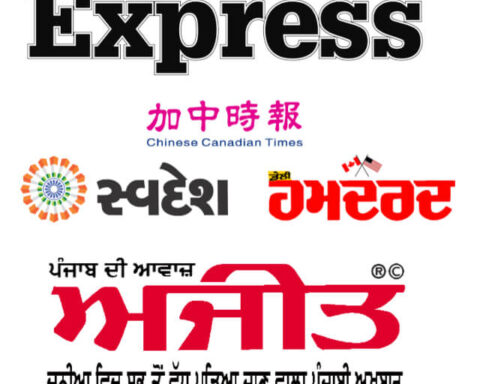![]() The Conservatives may have underestimated how much Canadians liked traditional media running the show, with new numbers from EKOS suggesting that not only do 74 per cent of Canadians want to see a major-network led debate, they want it even if Prime Minister Stephen Harper refuses to participate.
The Conservatives may have underestimated how much Canadians liked traditional media running the show, with new numbers from EKOS suggesting that not only do 74 per cent of Canadians want to see a major-network led debate, they want it even if Prime Minister Stephen Harper refuses to participate.
“This decision does not rest well with voters who see the traditional debates as a very important basis for voter choice and a healthy democratic process,” says EKOS President Frank Graves, citing that 62 per cent consider the debates to be important in deciding how to vote.
“While being deeply skeptical about the motives of the Prime Minister, and any parties that don’t think that all of the leaders should be present for all of the debates, the public overwhelmingly think the traditional debate should proceed, with or without Mr. Harper.”
Harper upset what had appeared to be a done deal when he announced in early May that he would not be taking part in the traditionally held leaders debate hosted by a consortium of television networks, including CTV, Global and Radio-Canada, saying he was open to taking part in up to five debates if other viable offers were made.
And some were. Debate invitations from Maclean’s, TVA, the Globe and Mail, Bloomberg and the Munk Debates have all been accepted by the Conservatives, who despite repeated attempts by the consortium to compromise, maintain they won’t participate.
“That debate has been such a large part of our electoral past, that if any one leader were to say they don’t want to do it then of course people are going to say, ‘well, that’s up to you’. It would be a mistake, I think for the prime minister to do that.” – Bob Rae
The Liberals, New Democrats, Greens and Bloc Quebecois however have all agreed to a consortium debate that could unfold on a stage with an empty seat saved for the PM, although many observers assume Harper will break down and take his seat.
“That debate has been such a large part of our electoral past, that if any one leader were to say they don’t want to do it then of course people are going to say, ‘well, that’s up to you’. It would be a mistake, I think for the prime minister to do that,” says former federal Liberal leader and former Ontario NDP premier Bob Rae.
“I don’t think the public thinks highly of people who don’t bother to turn up.”
Respondents who identified as Liberals and New Democrats in particular were pleased with the old format, with approval ratings of 74 and 71 per cent respectively.
Their Conservative counterparts, however, express much lower support, although a majority — 46 per cent — of respondents still favour the old approach, versus 21 per cent of those who don’t like the format and 28 per cent who are neutral on the topic.
When asked if, “by not participating in the network debates and going to smaller media organizations, Mr. Harper is bringing more open and innovative democracy to the leaders’ debate”, a whopping 67 per cent disagree and only 16 per cent agreed.
The Liberal Party has promised that, if elected on October 19th, it will institute a national debate commission modelled on the U.S. Commission on Presidential Debates.
But the debates are an essential part of the electoral process, with the power to make or break some candidates, with failures like that of Michael Ignatieff in 2011 or successes like the subsequently elected NDP candidate Rachel Notley in Alberta.
“It helped to change their campaign,” says Wilfred Laurier and Guelph University political science professor and former Globe and Mail editor Geoffrey Stevens.
“It reinforced the strength of the NDP, it undermined the Progressive Conservatives and it convinced people watching the debates that they didn’t have to be afraid of the NDP. The debates showed that it was a safe vote, that these were not radicals or dangerous socialists, but people with heads screwed on tight in the right direction and a safe place to park your vote.”
Including the Green Party a Must
It’s clear that, no matter how you phrase it, Canadians are in disagreement with the prime minister. When asked if, “by not participating in the network debates and going to smaller media organizations, Mr. Harper is bringing more open and innovative democracy to the leaders’ debate”, a whopping 67 per cent disagree and only 16 per cent agreed.
The only clearer answer the numbers give is where Elizabeth May belongs in the debates and the answer is — at a resounding 81 per cent — on the stage with the other leaders.
“In a democracy with any party running candidates, it’s really shocking that the Globe and Mail, Bloomberg, Munk and TVA think that it’s appropriate to construct a debate where a parliamentary party isn’t included.” – Elizabeth May
While May will take part in the consortium debate, someone just needs to tell the other debate hosts, because none of them have invited her.
“I don’t know if I need to remind the Globe and Mail and the other outlets of how our Canadian democracy works but it is a Westminster parliamentary democracy,” says May, adding that Reform was given a voice when they weren’t even running candidates across the country, unlike the Greens now, so why shouldn’t she?
“In a democracy with any party running candidates, it’s really shocking that the Globe and Mail, Bloomberg, Munk and TVA think that it’s appropriate to construct a debate where a parliamentary party isn’t included.”
Published in Partnership with iPolitics.ca.




